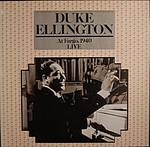Duke Ellington at Fargo, 1940 Live
| Duke Ellington at Fargo, 1940 Live | |
|---|---|
 |
|
| Live album by Duke Ellington | |
| Released | 1978 |
| Recorded | 7 November 1940 |
| Venue | Fargo, North Dakota |
| Genre | Jazz, big band |
| Label | Book-of-the-Month |
| Professional ratings | |
|---|---|
| Review scores | |
| Source | Rating |
| Allmusic | |
| Allmusic | |
Duke Ellington at Fargo, 1940 Live is a live album by the Duke Ellington Orchestra that won the Grammy Award for Best Large Jazz Ensemble Album in 1980. The album was recorded at a dance in Fargo, North Dakota.
In 1939, two cooperative extension service workers and former South Dakota State College students, Jack Towers and Richard Burris, sought permission from the William Morris Agency representing Duke Ellington to record an upcoming concert in Fargo, North Dakota. Permission was granted to the two Ellington fans provided they receive permission from Ellington and the venue's manager before the show.
The show was held on 7 November 1940 at the Crystal Ballroom on the second floor of the Fargo City Auditorium at the corner of First Avenue South and Broadway. (The building was demolished in 1962). The concert was a dance, a normal venue for jazz bands at that time but an unusual setting for a live recording, most of which would have been made of concerts, nightclubs, or radio broadcasts. The Crystal Ballroom featured a glass ball two feet in diameter hanging from the ceiling that reflected the dancehall's lights.
The original recording of At Fargo was effectively an amateur, bootleg recording, albeit approved. The recording equipment included a Presto portable turntable that cut the recording into 16-inch, 33 1⁄3-rpm acetate-covered aluminum disks. The recording turntable was set up next to Ellington's piano. Five and one-half of six disks with a recording capacity of 15 minutes per side were used in the recording. A Fargo radio station, KVOX (now KVXR), broadcast part of the show live.
Ellington's orchestra played several warm-up pieces before Ellington came out to his piano. The band then played "Sepia Panorama", the band's theme song before adoption of "Take the 'A' Train" in 1941. In addition to Ellington himself, notable soloists included Ben Webster, Jimmy Blanton, Johnny Hodges, Rex Stewart, and Tricky Sam Nanton.
...
Wikipedia
